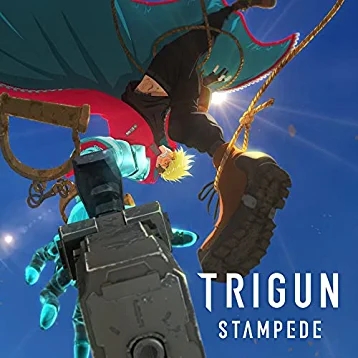Music: Trigun Stampede
February 18, 2023 · 0 comments
By Andrew Osmond.

Just days after the news broke that Anime Limited licensed the soundtrack to Makoto Shinkai’s Suzume, the company has announced it also has the soundtrack to Trigun Stampede. Just to clarify, this is the brand-new series now streaming on Crunchyroll, made by the CG studio Orange (Beastars, Land of the Lustrous). It’s an all-new version of the 1990s Trigun manga by Yasuhiro Nightow, chronicling the exploits of the gunslinger Vash the Stampede, who many fans met through the first Trigun anime by Studio Madhouse.
Interviewed by Anime News Network, one of the new version’s producers, Katsuhiro Takei, paid tribute to previous versions of Trigun, but he stressed the Orange anime was made with newcomers in mind. “As a producer, personally, I’m very attached to the old Trigun – which is very legendary – but also, I don’t want people to feel alienated. I don’t want new viewers to think that it’s something harder to come into because it’s an already known and existing series. I want it to be easy for people to come in.”
The Trigun Stampede soundtrack is by Tatsuya Kato, who did the music for the Free! swimming franchise, Dr. Stone, Revue Starlight, Love Live! Sunshine and Future Diary. Now, that’s what you call wide-ranging expertise. This soundtrack collection does not include Trigun Uprising’s opening and closing songs, which were by other musicians.
Many of the tracks, unsurprisingly, recall Western (as in Wild West) movies, specifically the music tradition laid down by Ennio Morricone in the spaghetti westerns he scored for Sergio Leone. (Incidentally, those films started with 1964’s A Fistful of Dollars, which was an unofficial remake of Akira Kurosawa’s samurai film Yojimbo; an infamous lawsuit followed.) For younger viewers, they may know the tradition more from the soundtracks to action films by Tarantino, who worships Leone. The titular “Trigun Stampede” track at the end of the album, full of swaggering funk, feels especially post-Tarantino.
If you’re a fan of rousing swagger, I’d also recommend “The Jeneora Rock Resistance” midway through the album, which happily puts together lush orchestra with scratch effects. It’s the kind of track you’d expect to get in a Shinichiro Watanabe anime. A couple of tracks further on, “Escape” goes heavy on the funk; it reminded me pleasantly of “Loosey” by the German band the Stripes, which was the title track for the old Burst Angel anime by Gonzo. “Chase” continues the album’s ebullient streak; true to its name, it’s an especially propulsive number.
Some later tracks have a hard-edged remorselessness, like “Planet Zaji.” Following on from that, the percussive “Shadow” and rasping “Cyborg” suggest horror as much as action, while “Dud” completes the hard-edged streak. If you want a break from such intensity, skip back to the album’s laid-back opener, “Immigrant Space Explorer,” which evokes grand vistas in the manner of Star Trek before toughening up midway. It goes together well with an almost anonymously-named track, “Bio-Power Reactor,” which is full of stately lushness.
There’s also a trio of plangent numbers whose connection may be suggested in the tracks’ names – “Childhood Memories,” “Memory of Piano” and “Reality.” And lastly, there’s one very brief, valedictory, number called “Blues Harp in the Wasteland,” which might be a hat-tip to another space-age anime cowboy, Spike Spiegel.
Andrew Osmond is the author of 100 Animated Feature Films. The Trigun Stampede soundtrack is available from Anime Limited.
Leave a Reply